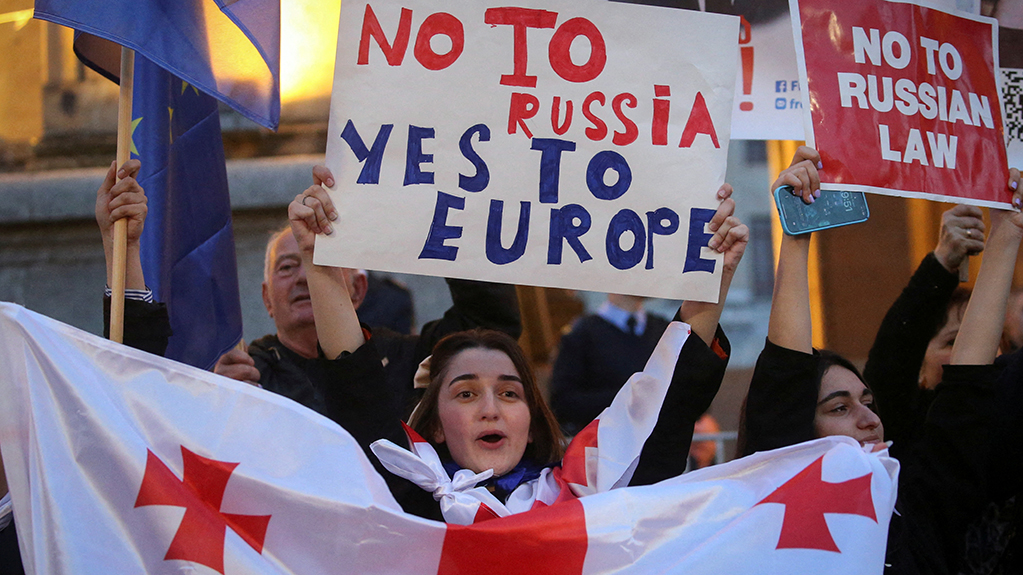The Communications Commission fined the TV company Mtavari Arkhi 2500 GEL for airing videos about the Russian Law. The commission deemed the videos as political advertisements and concluded that their purpose was to prevent the election of the party supporting the so-called Agents Law, namely Georgian Dream, in the parliamentary elections.
News
Trending stories
- 1 Former Prime Minister Garibashvili Sentenced to Five Years in Prison After Plea Deal
- 2 Otar Partskhaladze Charged with Organizing Murder of Businessman Levan Jangveladze
- 3 Shalva Papuashvili Says Georgian Dream Filed Complaint with BBC
- 4 Georgian Dream Party Further Tightens Grants Law, Introducing Up to 6 Years in Prison
In one of the videos that the regulatory body requested to be removed from the air, footage from protests against the Russian law was shown in the background of Niaz Diasamidze's song. At the end, the inscription "Yes to Europe, no to the Russian law" appeared. The second video highlighted the activities of the community radio station Marneuli. The video stated, "Just as it is easy to find examples of the good that Western knowledge and assistance have brought to civil society in Georgia, it is equally easy to see the danger posed to all parts of society by the implementation of the Russian law."
Since the commission assessed these videos as political advertisements, and broadcasters are prohibited from airing political advertisements during non-election periods, Mtavari Arkhi was fined and ordered to remove the videos from its broadcasting network.
"The Georgian law on transparency of foreign influence is presented in a negative context in these political content videos, referring to it as a Russian law that poses a threat to all parts of society. These video clips mobilize the public against those political associations and their representatives who supported the adoption of the law on transparency of foreign influence. Therefore, the Communications Commission concluded that the purpose of the videos is to prevent the election of political unions supporting the aforementioned law in the upcoming parliamentary elections," the statement published by the Communications Commission reads.
Mtavari Arkhi disagrees with the decision and plans to appeal to the court. Tamta Muradashvili, the TV company's lawyer, explained at the commission session that the videos were posted not as political but as social advertisements, and no political party was mentioned.
"You interpret the content, evaluate the social clip negatively because the Russian law was mentioned, and conclude that it is directed against a particular party with the intent to hinder its election, while this party itself does not consider the law an obstacle for them, and on the contrary, adopted it before the elections," Muradashvili said.
Communications Commission lawyer Irakli Boothbaya explained what was "negative" in the controversial videos: "The assessment by the Commission's apparatus does not address whether this law will have a negative or positive impact. It focuses on the negative portrayal of the law in the clips on your channel and its effect. In one case, it is stated that this law will be damaging and cause significant harm. In both cases, the law is stigmatized by being referred to as a Russian law, even though it is not officially called that."
Representatives of the non-governmental organization Georgian Democratic Initiative (GDI) also participated in the commission session. According to Eduard Marikashvili and Vasil Zhizhilashvili, imposing censorship on the media for mentioning the Russian law is another manifestation of the authoritarian regime. They argue that the main message is for broadcasters to stop criticizing current events in the country, including the adoption of the Russian law, despite the fact that the law directly impacts broadcasters on the one hand, and on the other, significantly harms Georgia's European integration process.
"In our opinion, the commission's decision indicates that the Communications Commission will be one of the main actors in pursuing the ruling party's interests and suppressing criticism of the Russian law before the elections," GDI representatives noted.
The Communications Commission also fined Mtavari Arkhi in July. At that time, the regulatory body considered a video clip that showed and named the members of parliament who supported the Russian law as a political advertisement.















